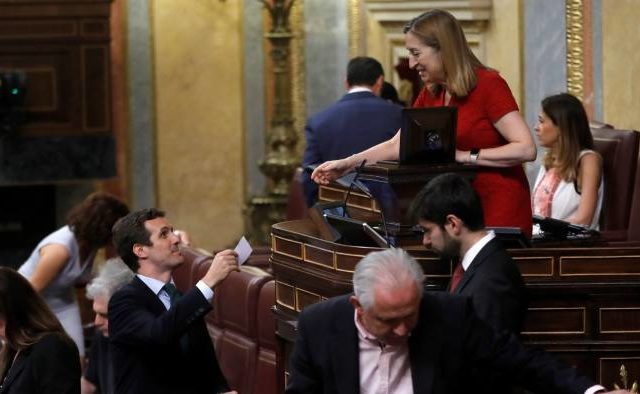The Socialist government of Spanish prime minister Pedro Sánchez on Friday lost its first big vote since taking office, highlighting the difficulty the minority administration will have navigating Spain’s increasingly polarised political landscape. Mr Sánchez’s plans to raise the government’s 2019 spending cap and ease its deficit targets were defeated after the parties that brought the Socialists to power in June abstained in the vote. The decision by several regional parties, including Catalan separatists, and the leftwing Podemos grouping — which all had backed the crucial no confidence vote against the previous centre-right government — doomed the budget motion to failure. The government’s problems have raised questions over whether Mr Sánchez can rule with little more than a quarter of the seats in parliament, and the uncertain backing of a fractious group of rival parties. Mr Sánchez had wanted to increase the ceiling on government spending by 4.4 per cent to €125bn, €5.2bn more than in 2018, and to raise the country’s deficit target to 1.8 per cent of gross domestic product, from 1.3 per cent. The higher deficit target had been negotiated with Brussels. “This vote appears incomprehensible to us, illogical and damaging to the citizens,” said Isabel Celaá, government spokeswoman and education minister. While the PSOE appeared at one point to have enough support in other parties to pass the budget measure, leadership changes in two parliamentary groups changed the political calculus. Moderate nationalists were purged last weekend from the ruling council of PDeCAT, a Catalan separatist party, and new party president David Bonvehí warned: “If Pedro Sánchez doesn’t offer us a referendum [on independence], it will be harder and harder to support his government.” At the same time, the centre-right People’s party chose Pablo Casado to replace ousted prime minister Mariano Rajoy as leader, pushing the party to the right and signalling harder opposition to Mr Sánchez. Mr Casado said the PP would vote against the measure in the Senate, where it has an absolute majority. As the bill appeared doomed to failure in the upper house, the PSOE’s allies took the opportunity to highlight the differences between themselves and the Socialists. Podemos, which had wanted a higher increase in the maximum amount the government can spend, cited the small rise proposed by the government as a reason for its abstention. “The spending cap presented by the PSOE government was designed to please the PP. And, despite this, the PP has said it will vote against it,” the leftwing party said. The government has a month to resubmit its spending cap and deficit plan, or could instead choose to maintain spending next year at 2018 levels. Mr Sánchez’s government has posited various ways to raise more revenues, including a tax on the banking industry.
Despite his problems Mr Sánchez insists that Spain will hold elections as scheduled in 2020. “No one is thinking of calling early elections, although no one is going to resist beyond when it’s reasonable,” Ms Celaá added this week. “That would be absurd.” Analysts said the failed vote would not be fatal for the Sánchez government. “It’s a political defeat for the government, obviously, but it is not something that will make the government fall,” said Pablo Simón, professor of politics at Madrid’s Carlos III University. “All the world knows that they won’t reach the deficit goals for 2018 and 2019. Government always spends more in electoral years.” The failure of the vote was “just the first salvo in a protracted political battle to stay in power”, said Antonio Barroso, deputy director of research at Teneo Intelligence. “Sánchez will have a hot political autumn. When he comes back from summer, you’re going to have the budget, the national day and referendum anniversary protests in Catalonia, and new taxes. A new banking tax would have to be voted by parliament.”




The Most Read
Сryptocurrencies
Bitcoin and Altcoins Trading Near Make-or-Break Levels
Financial crimes
Thieves targeted crypto execs and threatened their families in wide-ranging scheme
Financial crimes
Visa Warning: Hackers Ramp Up Card Stealing Attacks At Gas Stations
News
Capitalism is having an identity crisis – but it is still the best system
Uncategorized
The 73-year-old Vietnamese refugee is responsible for bringing Sriracha to American consumers
Uncategorized
Electric Truckmaker Rivian, Backed By Amazon, Ford, Raises Whopping $1.3 Billion